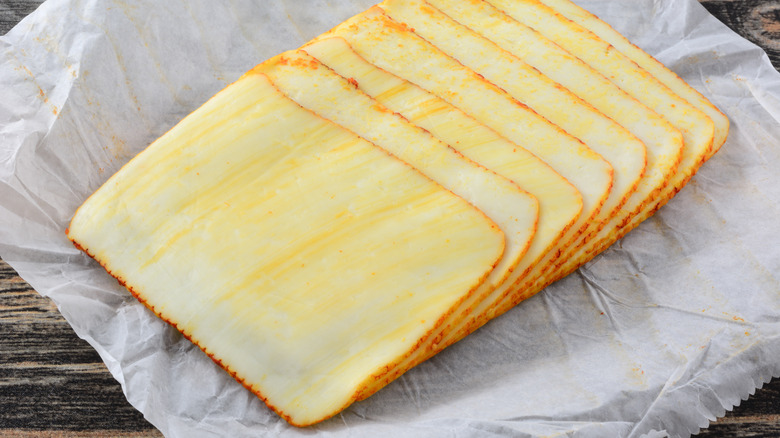Cheese lovers are always on the lookout for delicious and healthy options.
One type that often sparks curiosity is Muenster cheese.
With its creamy texture and mild flavor, it’s a popular choice in sandwiches, burgers, and even cheese boards.
But many health-conscious individuals are left wondering: Is Muenster cheese good for you?
This article dives deep into the nutritional profile, benefits, and potential drawbacks of Muenster cheese to answer that question comprehensively.
What is Muenster Cheese?
Muenster cheese, sometimes confused with the French Munster, has American and European roots, but the two varieties differ slightly.
The American version was developed by German immigrants in the United States, who adapted the traditional European Munster to suit American palates.
While both versions share a similar creamy texture, American Muenster is milder, with a more delicate flavor profile, compared to the pungent Munster from France.
This cheese is typically light in color with a smooth, semi-soft texture and a distinctive orange rind, created by washing it in an annatto solution during the aging process.
Muenster cheese is highly versatile, making it a popular choice for various dishes—from grilled cheese sandwiches to pizzas, burgers, and casseroles.
It melts easily and provides a creamy texture, making it ideal for hearty meals.
Nutritional Value of Muenster Cheese
A key factor in evaluating the healthiness of Muenster cheese lies in its nutritional profile.
Let’s look at what you get in one serving, typically about 1 ounce (28 grams):
- Calories: 104
- Protein: 6.6 grams
- Total Fat: 8.5 grams (5.3 grams from saturated fats)
- Carbohydrates: 0.3 grams
- Calcium: 200 mg (~15% of daily recommended intake)
- Vitamin A: 6% of daily value
- Vitamin D: Trace amounts
Muenster cheese stands out as a low-carb food with only trace amounts of carbohydrates, making it suitable for ketogenic and low-carb diets.
Calcium and protein levels are relatively high, contributing to its reputation as a nutrient-dense dairy product.
However, it is also high in saturated fat and sodium, two elements that need to be consumed in moderation.
Health Benefits of Muenster Cheese
1. Rich in Calcium and Phosphorus
Muenster cheese provides significant amounts of calcium and phosphorus, two essential minerals that promote strong bones and teeth.
These minerals work together to reduce the risk of osteoporosis, especially when consumed regularly as part of a balanced diet.
2. Protein Source with Essential Amino Acids
This cheese is packed with protein, which plays a vital role in muscle growth, tissue repair, and enzyme production.
The protein in Muenster contains essential amino acids that the body cannot produce on its own, making it an excellent addition for athletes or individuals looking to boost their protein intake.
3. Lactose-Friendly Option
While not lactose-free, aged Muenster cheese tends to have lower lactose content than other dairy products.
This makes it easier to digest for individuals with mild lactose intolerance, allowing them to enjoy cheese without discomfort.
4. Vitamins A & D for Immune and Bone Health
Muenster contains vitamin A, essential for healthy vision and skin, and vitamin D, which helps the body absorb calcium.
Both vitamins contribute to a stronger immune system, making this cheese more than just a flavorful indulgence.
5. Gluten-Free Option
For those with gluten sensitivities or celiac disease, Muenster cheese is a safe choice since it is naturally gluten-free.
Potential Side Effects
1. High in Saturated Fat
Muenster cheese contains saturated fats, which, when consumed in excess, can raise LDL (bad) cholesterol levels, increasing the risk of heart disease.
It’s essential to limit intake, especially for those with cardiovascular concerns.
2. Elevated Sodium Levels
With sodium levels at around 180 mg per serving, eating too much Muenster can contribute to high blood pressure.
Individuals with hypertension or those on low-sodium diets should monitor their cheese consumption carefully.
3. Caloric Density and Weight Management
While the cheese offers several nutrients, its high caloric content can contribute to weight gain if consumed in large portions without balancing with physical activity.
Moderation is key, especially for those watching their calorie intake.
4. Potential Allergies
Since it is a dairy product, Muenster cheese may trigger allergies in people who are allergic to milk proteins like casein.
Those with dairy allergies should avoid it entirely to prevent allergic reactions.
How to Use Muenster Cheese in Your Diet
Muenster cheese’s mild, creamy flavor makes it a perfect addition to various dishes.
Here are some popular ways to enjoy it:
- Grilled Cheese Sandwiches: Layer Muenster between bread slices and toast until golden brown. Its superior melting quality makes it a favorite for grilled sandwiches.
- Topping for Burgers: Melt a slice of Muenster on your burger for a rich, gooey topping that enhances every bite.
- Cheese Boards: Pair Muenster with fruits, nuts, and crackers on a cheese board. Its mild flavor balances well with more robust cheeses.
- Stuffed Peppers or Casseroles: Add Muenster to stuffed peppers or casseroles for a creamy texture that elevates the dish.
- Pizza or Quesadillas: Use Muenster as a topping on pizzas or inside quesadillas for a unique, creamy twist.
Healthy Consumption Tips
1. Moderation is Key
As with most high-fat foods, portion control is essential.
Aim to limit your serving to about 1 ounce to enjoy the flavor without overloading on calories or saturated fat.
2. Combine with Healthy Foods
Balance Muenster cheese with healthy sides such as vegetables or whole grains.
This can create a more nutritious meal that includes fiber, vitamins, and minerals.
3. Check Labels for Reduced-Fat Versions
Some stores offer reduced-fat varieties of Muenster cheese.
These versions can be a good alternative if you’re looking to cut down on fat while still enjoying the flavor.




